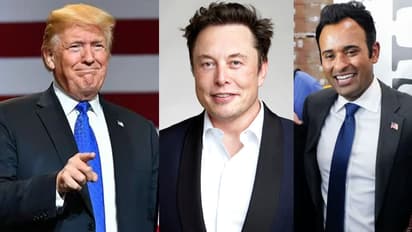Musk and Ramaswamy: Catalysts for Trump's government efficiency overhaul

Synopsis
Donald Trump has appointed Tesla’s Elon Musk and biotech entrepreneur Vivek Ramaswamy to lead the Department of Government Efficiency (DOGE), an initiative focused on cutting government spending and regulations. The team aims to achieve significant reforms by July 4, 2026.
President-elect Donald Trump has selected Tesla CEO Elon Musk and biotech entrepreneur Vivek Ramaswamy, who previously ran for president as a Republican, to lead a new initiative aimed at reducing government spending, cutting down on regulations, and overhauling federal agencies.
In a statement released Tuesday night, Trump announced that Musk, the wealthiest person in the world who manages six companies, and Ramaswamy will head a newly created group called the Department of Government Efficiency, or "DOGE." The goal of DOGE is to simplify and streamline the way government works by cutting unnecessary bureaucracy, Trump explained.
Trump stated that DOGE will function independently from the federal government but will collaborate with the White House Office of Management and Budget to put its suggestions into action.
Musk is not expected to take on an official government role, which means he probably won't have to give up his involvement in his businesses. Trump has given Musk and Ramaswamy a deadline of July 4, 2026, which coincides with the nation's 250th anniversary celebrations and comes just a few months before the midterm elections, to finish their work.
He said, "A smaller, more efficient government with less red tape will be the perfect gift to America on the 250th anniversary of the Declaration of Independence. I’m confident they will succeed!"
Musk has mentioned before that he aims to reduce federal spending by at least $2 trillion. However, outside experts have pointed out that this would be challenging to accomplish. In the 2024 fiscal year, the government spent around $6.8 trillion.
Musk's political action committee, America PAC, spent about $200 million to support Trump during the presidential election. According to sources familiar with the situation, Musk has become one of Trump's closest advisers. He has attended transition meetings, advised on staffing decisions, and spent personal time with Trump at his Mar-a-Lago resort. The acronym for the new group, DOGE, is similar to the name of Dogecoin, a cryptocurrency that Musk has often promoted online.
Trump and his team have pledged to bring back and expand the policies he introduced during his first term that aimed to reduce government regulations and make it easier to fire federal employees. In 2020, just before leaving office, Trump signed an executive order that removed certain federal jobs from the usual competitive hiring process and civil service protections.
The order gave the administration the power to decide which government jobs would become "at will" positions (meaning employees could be dismissed more easily without needing a specific reason). When Biden took office, he reversed the executive order. However, Trump’s advisers say that if he returns, he plans to introduce an even broader version of it.
In Trump’s first term, he set a rule that for every new regulation a federal agency wanted to create, they had to remove two existing ones. This was meant to reduce government rules and paperwork, making it easier for businesses and individuals to follow laws without being overwhelmed by too many regulations. It was an effort to cut down on what many see as "red tape" or unnecessary government restrictions.
In a September speech outlining his economic plans, Trump stated that in his second term, he would eliminate at least 10 existing regulations for every new one introduced. His goal is to drastically reduce government rules, making it easier for businesses to operate by cutting unnecessary regulations and streamlining the system.
As a presidential candidate, Ramaswamy made cutting government waste a key focus of his campaign. He called for getting rid of several agencies, including the Department of Education, the FBI, the Nuclear Regulatory Commission, and the Bureau of Alcohol, Tobacco, Firearms, and Explosives. Trump has also supported the idea of eliminating the Department of Education.
However, shutting down a federal agency (a government department or organization) is not as simple as it sounds, according to experienced government workers from both parties. It would need approval from Congress, and even if Republicans keep control of the House, it could still be a challenge. The GOP (Grand Old Party or the Republican Party) is expected to have a majority in the Senate next year, but that doesn’t guarantee it will be easy to close these agencies.
Who is Vivek Ramaswamy?
Vivek Ramaswamy, born in Cincinnati, Ohio, on August 9, 1985, is a prominent biotech entrepreneur and political thinker known for his anti-woke and anti-establishment views. The son of Indian immigrants from Kerala, his father worked as an engineer and patent lawyer, while his mother was a geriatric psychiatrist. Ramaswamy excelled academically and athletically, graduating as valedictorian from a Jesuit high school before studying biology at Harvard and obtaining a law degree from Yale, where he met his wife, Apoorva Tewari, a future surgeon. In 2014, at the age of 29, he founded Roivant Sciences, a biotech company that focuses on developing underutilized pharmaceuticals, and by 2023, he had amassed personal earnings exceeding $250 million.
Check the Breaking News Today and Latest News from across India and around the world. Stay updated with the latest World News and global developments from politics to economy and current affairs. Get in-depth coverage of China News, Europe News, Pakistan News, and South Asia News, along with top headlines from the UK and US. Follow expert analysis, international trends, and breaking updates from around the globe. Download the Asianet News Official App from the Android Play Store and iPhone App Store for accurate and timely news updates anytime, anywhere.